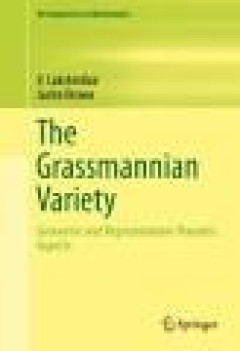Filter by

The Indian Textile and Clothing Industry
This book examines the textile and clothing Industry of India and its trade scenario from a global perspective. New developments in international policies related to trade and investment and falling barriers to trade worldwide as well as within individual regional communities have transformed the structure of production and global competition in the textile and apparel industries across the wor…
- Edition
- 1
- ISBN/ISSN
- 978-81-322-2370-2
- Collation
- XI, 105,3 b/w illustrations
- Series Title
- SpringerBriefs in Economics
- Call Number
- -

Personal and Organizational Excellence through Servant Leadership; Learning t…
Keunggulan Pribadi dan Organisasi melalui Kepemimpinan yang Melayani; Belajar untuk Melayani, Melayani untuk Memimpin, Memimpin untuk Mengubah. Di dunia yang disibukkan oleh kepentingan pribadi dan dirancang dengan cermat untuk membuat kita berfungsi dalam perlombaan hidup yang terus-menerus, kepemimpinan yang melayani dengan daya tariknya yang tampaknya tinggi sering kali disambut dengan kecur…
- Edition
- -
- ISBN/ISSN
- 978-3-319-16196-9
- Collation
- -
- Series Title
- Management for Professionals (MANAGPROF)
- Call Number
- 324.22 SEN p

Ideals, Varieties, and Algorithms: An Introduction to Computational Algebraic…
This text covers topics in algebraic geometry and commutative algebra with a strong perspective toward practical and computational aspects. The first four chapters form the core of the book. A comprehensive chart in the Preface illustrates a variety of ways to proceed with the material once these chapters are covered. In addition to the fundamentals of algebraic geometry—the elimination theor…
- Edition
- -
- ISBN/ISSN
- 978-3-319-16720-6
- Collation
- XVI, 646
- Series Title
- -
- Call Number
- 510 COX i

Personal Care Products in the Aquatic Environment
Buku tentang Produk Perawatan Pribadi di Lingkungan Perairan ini berisi informasi lengkap tentang nasib dan strategi penghilangan berbagai bahan yang digunakan sebagai produk perawatan pribadi dan lingkungan perairan serta dampaknya terhadap kesehatan manusia. Sebagian besar karya yang diterbitkan sejauh ini berkaitan dengan stabilitas produk komersial dan masalah yang berkaitan dengan penetras…
- Edition
- Vol. 36
- ISBN/ISSN
- 978-3-319-18809-6
- Collation
- -
- Series Title
- The Handbook of Environmental Chemistry (HEC)
- Call Number
- 578.7 CRU p

The Hamburg Lectures on Maritime Affairs 2011-2013
In 2007, the International Max Planck Research School for Maritime Affairs together with the International Tribunal for the Law of the Sea (ITLOS), both based in Hamburg, decided to establish an annual lecture series, the "Hamburg Lectures on Maritime Affairs" - giving distinguished scholars and practitioners the opportunity to present and discuss recent developments in this field. The present …
- Edition
- 1
- ISBN/ISSN
- 978-3-642-55104-8
- Collation
- X, 302, 4 b/w illustrations
- Series Title
- Hamburg Studies on Maritime Affairs Hamburg Studies on Maritime Affairs
- Call Number
- -

The Grassmannian Variety
This book gives a comprehensive treatment of the Grassmannian varieties and their Schubert subvarieties, focusing on the geometric and representation-theoretic aspects of Grassmannian varieties. Research of Grassmannian varieties is centered at the crossroads of commutative algebra, algebraic geometry, representation theory, and combinatorics. Therefore, this text uniquely presents an exciting …
- Edition
- 1
- ISBN/ISSN
- 978-1-4939-3082-1
- Collation
- X, 172, 84 b/w illustrations, 39 illustrations in colour
- Series Title
- Developments in Mathematics
- Call Number
- -

Analysis and Geometry: MIMS-GGTM, Tunis, Tunisia, March 2014. In Honour of Mo…
This book includes selected papers presented at the MIMS (Mediterranean Institute for the Mathematical Sciences) - GGTM (Geometry and Topology Grouping for the Maghreb) conference, held in memory of Mohammed Salah Baouendi, a most renowned figure in the field of several complex variables, who passed away in 2011. All research articles were written by leading experts, some of whom are prize winn…
- Edition
- Ed. 1
- ISBN/ISSN
- 978-3-319-17443-3
- Collation
- VIII, 266
- Series Title
- Springer Proceedings in Mathematics & Statistics
- Call Number
- 515.3 ANA a

Perfecting Engineering and Technical Drawing, Reducing Errors and Misinterpre…
Sebagian besar perusahaan yang telah dikaitkan dengan saya membenarkan ketidakpatuhan mereka dengan menggunakan pembenaran "Begitulah cara kami selalu melakukannya," "Kami telah melakukannya seperti itu sebelumnya, "atau" Tidak ada yang akan memahami penerapan itu.” Kekeliruan ketidakpatuhan ini hanya membingungkan pengguna gambar lainnya (pelanggan, pemasok, produsen, inspektur, dll.). Biasa…
- Edition
- Vol. 139
- ISBN/ISSN
- 978-3-319-06983-8
- Collation
- -
- Series Title
- Briefs in Applied Sciences and Technology (BRIEFSAPPLSCIENCES)
- Call Number
- 620.0042 HAN p

An Invitation to Web Geometry
This book takes an in-depth look at abelian relations of codimension one webs in the complex analytic setting. In its classical form, web geometry consists in the study of webs up to local diffeomorphisms. A significant part of the theory revolves around the concept of abelian relation, a particular kind of functional relation among the first integrals of the foliations of a web. Two main focus…
- Edition
- Ed. 1
- ISBN/ISSN
- 978-3-319-14562-4
- Collation
- XVII, 213
- Series Title
- IMPA Monographs
- Call Number
- 515.3 PER i

An Invitation to General Algebra and Universal Constructions
Rich in examples and intuitive discussions, this book presents General Algebra using the unifying viewpoint of categories and functors. Starting with a survey, in non-category-theoretic terms, of many familiar and not-so-familiar constructions in algebra (plus two from topology for perspective), the reader is guided to an understanding and appreciation of the general concepts and tools unifying…
- Edition
- Ed. 1
- ISBN/ISSN
- 978-3-319-11478-1
- Collation
- X, 572
- Series Title
- Universitext
- Call Number
- 512 BER i
 Computer Science, Information & General Works
Computer Science, Information & General Works  Philosophy & Psychology
Philosophy & Psychology  Religion
Religion  Social Sciences
Social Sciences  Language
Language  Pure Science
Pure Science  Applied Sciences
Applied Sciences  Art & Recreation
Art & Recreation  Literature
Literature  History & Geography
History & Geography